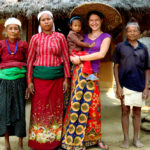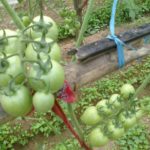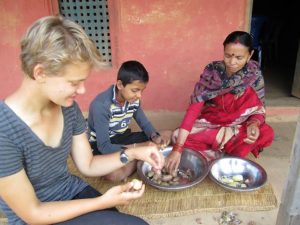Nepal: Mountain View Eco Farm
Mountain View Eco Farm is  committed to improving the livelihood of resource-poor farmers through research, development, and the promotion of sustainable agricultural systems. Village Volunteers is proud to have been in support of Mountain View Eco Farm from the beginning.
committed to improving the livelihood of resource-poor farmers through research, development, and the promotion of sustainable agricultural systems. Village Volunteers is proud to have been in support of Mountain View Eco Farm from the beginning.
As a volunteer, you will be immersed in Nepali culture by working in organic agriculture, livestock, education, community development, agroforestry, environment and ecology and as well as working with children. Click here to read about the experience of one of our volunteers.
We love helping volunteers find their perfect placement. Fill out our Interest Form to get started!
Mountain View Eco Farm was established with the common objective to create an eco-friendly environment with a learning center set on an exemplary organic farm that teaches sustainable and healthy food production.
It is vital that Nepal learns about organic approaches to farming as a route to sustaining a healthy, local food production for the future.
The Learning Center targets:
1. Youth – Many young Nepalese believe the only path to a good life requires leaving the country for education and work. Organic farming is one way to offer a sustainable lifestyle that benefits our environment and culture and keeps the best of our young people in our country. MVEF partners with local school districts to host school groups and involves children in firsthand educational experience to learn where their food comes from and the possibilities of a career in farming.
2. Farmers – There is a need and a growing interest of farmers throughout Nepal to transition to permaculture farming. Courses and workshops will show farmers firsthand the crop yield and quality of food grown at MVEF. The hope is to help them begin to shift away from dependence on chemicals and pesticides that harm both people and the environment.
3. Visitors and volunteers – Volunteers bring a hospitality industry to help support programs. As we develop the resources required, they invite volunteers to lodge at MVEF. Here they can experience traditional Nepalese life, learn about organic farming, and enjoy healthy food. This exchange of skills and cultures benefits everyone. Working in the local school and clinic provides rural people an opportunity to learn and to share their knowledge and life experiences.
Mountain View Eco Farms Goal
- To promote organic agriculture by creating awareness through demonstration, action, research, and development.
- To teach youth about permaculture and sustainable farming practices.
- To provide farming communities with the relevant skills and technology for better food production and income generation in a sustainable way.
- To provide training and professional services to individuals involved in sustainable agriculture development.
- To empower rural communities and improve their level of understanding, access to resources, information, and markets related by establishing organic agriculture resource center.
- To advocate in the favor of organic agriculture and its importance in the national and international level.
- To provide a place where volunteers can work and be immersed in the Nepalese culture at their school and clinic.
ORGANIC AGRICULTURE IN NEPAL
Nepal is an agriculture-based economy with about 85% of the population dependent on agriculture; whereas 80 % of the population survives as agriculture laborers. Despite farmers doing hard labor, they are unable to improve their quality of living and instead live in miserable poverty.
survives as agriculture laborers. Despite farmers doing hard labor, they are unable to improve their quality of living and instead live in miserable poverty.
In Nepal, modern technology has been implemented to increase the supply of agriculture production. It has a history of using chemical fertilizers and pesticides for the last 35 years for higher agriculture production yields. This includes genetic modification, chemical fertilizers and synthetic pesticides in agriculture. Although the use of these chemicals provides instant benefits, in long run these chemicals destroy the production capacity and nutritional value of the soil; negatively impacting human life and leading to other environmental problems, such as decimating the natural variety of plants.
Since there are various places in Nepal that are still beyond the reach of these chemical inputs due to lack of transportation, we still have time to make them aware of the situation and stop using such chemicals. Farmers of Nepal are still far from all the negative environmental effects of the inorganic methods.
Before the use of chemical fertilizers, the quality of rice was very high and full of flavor. While the rice was being cooked in the kitchen, all the surrounding areas would be full of the aroma. With the use of fertilizers, the quality of rice has deteriorated; the production is high but the quality of taste and nutritional value has diminished. Due to the use of synthetic fertilizers and pesticides, all agriculture products are being contaminated and unhealthy. Also, using these kinds of chemicals negatively impacts the ecosystem and has a direct effect on climatic change and global warming.
Organic agriculture means agricultural systems that promote the environmentally, socially and economically sound production of crops. With respect to the natural capacity of plants, animals, and local conditions, it aims to optimize quality production in all aspects of agriculture and the environment. We must not think of agriculture with a commercial mind –viewing it for our individual benefits. Rather, by properly utilizing natural resources, which are gifts of nature, we should be able to produce high-quality agricultural products while compensating for nature.
Education/Children:
- Work with children at the local schools.
Agriculture and Sustainable Farming:
- Share knowledge and experience in organic farming methods
- Create awareness through demonstrations, skills training, research and development
- Assist on the farms with the various initiatives
Public Health Opportunities
A local clinic is happy to have volunteers.
General:
- Visit surrounding villages for cultural exchange
- Participate in local festivals and other cultural activities
There are also extra adventurous opportunities such as white water rafting in the Seti River and Annapurna trekking. A visit to the Royal Chitwan National Park and an elephant safari are other attractions (though these activities cost extra).
Once you visit Nepal, you will never want to leave. The spirit of Nepal will live on within you. Nestled in the cradle of the highest mountains on Earth, Nepal is an explorer’s paradise. Imagine people born deep in the Himalayan mountains, displaying the wisdom and patience of these mountains in every smile. This is Nepal.
Pokhara is an idyllic city in the Western Development Region of the Himalayan Kingdom of Nepal. The city is located 200 KM west (most of a day’s bus ride) of Kathmandu, and is referred to as the “Seven Lakes City” and “Gateway to the Himalayas.”
We are established with the common objective among our board members, who are from many different countries, to create an eco-friendly environment for visitors, as well as a training and educational center. We hope to become an exemplary organic farm for sustainable and healthy food production.
Foreign volunteers who wish to render their services in of organic agriculture at our Eco Farm can work in the fields of education, health, community development, environment, ecology, hunger, etc. In addition to this, the Nepali culture that will be experienced is rich and completely rewarding extending from daily life to traveling to festivals around the country. We can also visit surrounding villages to experience a more traditional form of Nepalese culture. Nepali culture is distinctively friendly and open and volunteers are made to feel as though they are part of the family.
Here there is plenty of adventure, such as white water rafting, trekking the Annapurna Circut, a visit to Royal Chitwan National Park, elephant safari, and much more. A popular place to visit is the birth place of Lord Buddha in Lumbini. Volunteers also have the opportunity to participate in and learn about local festivals.
Volunteers, visitors, researchers, students and others are heartily welcomed to join the program on their own, with their children, with partners, or group of friends.
MVEF provides:
A bed with: a cotton mat, blanket, sheet, pillow, and a mosquito net.
- A semi-private room (two people).
- Three meals a day of Nepali food (usually rice and lentils with curried vegetables and chapatti with dinner (Similar to a Thali)). As much as possible, we use the organic vegetables from our Farm. We will teach you Nepali cooking if you want!
- Bathing options include an indoor cold shower, with the option of a bucket of hot water.
- As much help to book transportation tickets, tourist information, etc, as needed, including personal guiding from the host.
- Boiled drinking water.
- Internet access.
- The experience of a lifetime.
- A squat toilet
- Free Internet access.
- The experience of a lifetime.
Drinking Water
Although they will provide boiled water, we ask that you bring a water filter if you go on a trek so that there is no need for plastic bottles.
Electricity
There is electricity in nearly all villages of Nepal. However, they have sweeping outages on a daily basis and it cannot be relied upon at all times.
Laundry
Volunteers have the option of laundering their own clothing or paying a fee to have it done for them. All volunteers must launder their own undergarments.
MEET THE DIRECTOR OF MOUTAIN VIEW ECO FARM, BEDRAJ PAULDEL (GOVINDA)
My Name is Bedraj Paudel (Govinda), a resident of KalikaVDC – 8, of Bardiya District, Nepal. I am a farmer, a program manager, and a student of Business Management. I grew up in a family of organic farmers and feel very strongly that it is important to the future of Nepal.
Since 2005 I had worked at SADP-Nepal (Sustainable Agriculture Development Program Nepal, a non-profit demonstration farm and educational program for organic farming in Nepal) in capacities including Program Assistant, Hospitality Supervisor, Tour Guide, Office Manager, Trainer, and Facilitator.
Besides managing the office and demonstration farm for SADP-Nepal, I began a school gardening program in local schools, to teach young people organic farming principles and provide schools with food.
My dream of starting Mountain View Eco Farm came through the support of volunteers. He has over 7 years of coordinating international volunteers. I love this work because I enjoy problem-solving, leadership, and spending time talking with people about ideas, attitudes, and experiences. I’m also very passionate about organic gardening and how crucial it is to Nepal’s future. I love my country and I’m proud and excited to share it with volunteers. I enjoy photography, cooking, plumbing, building plastic bottle houses, ponds, building traditional houses, smokeless stoves, gaining computer skills, web design, and more. My hobbies include chess, sports, traveling, reading, and having fun.


